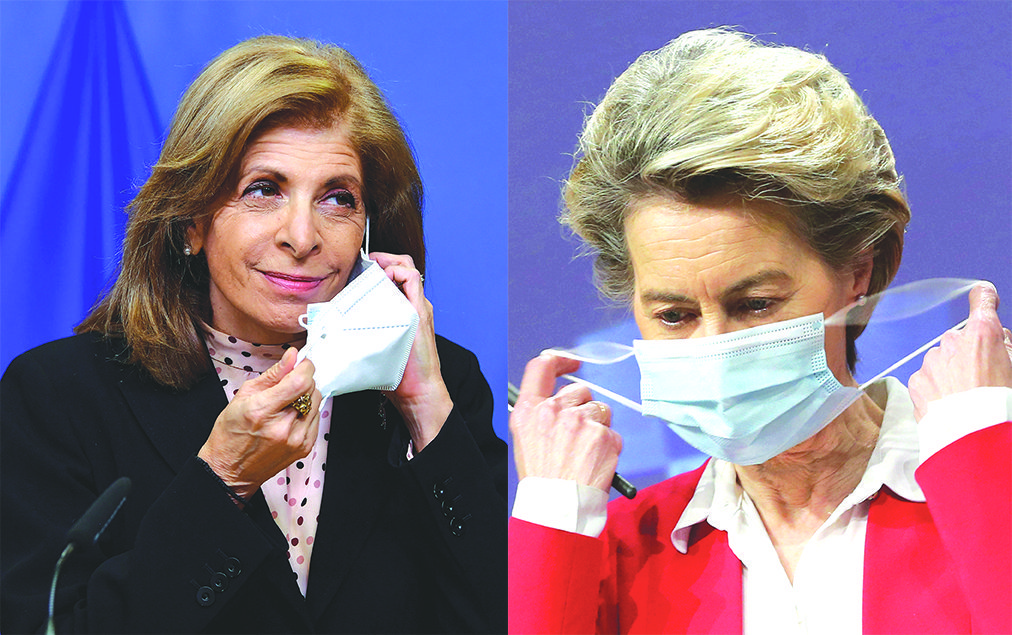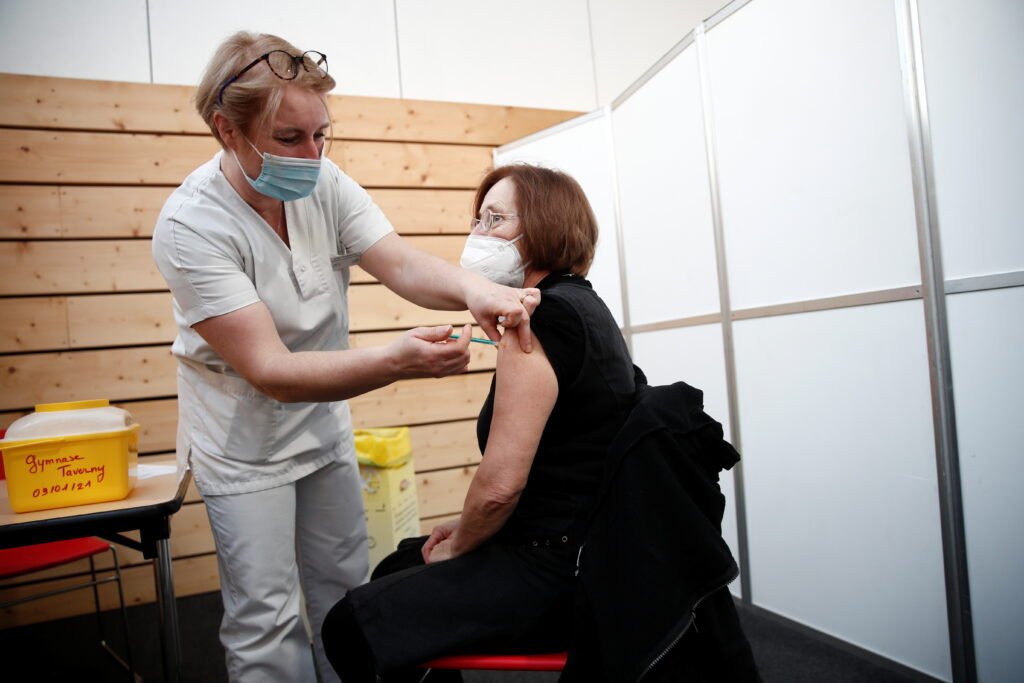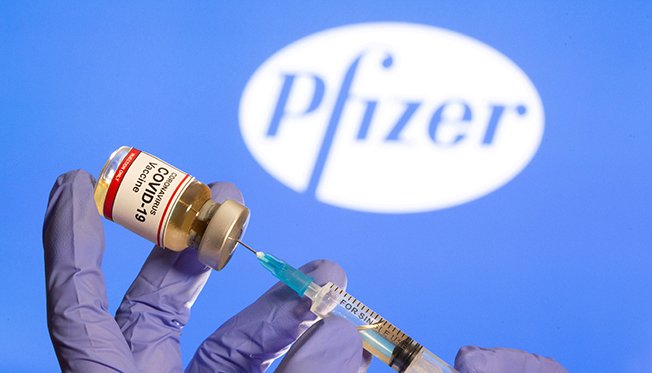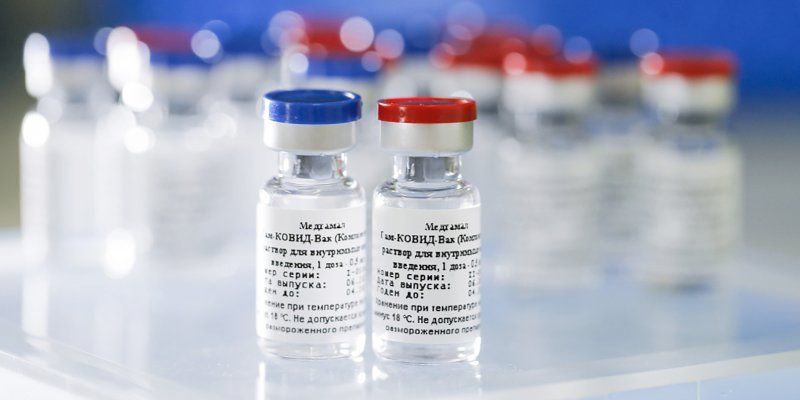Questions began being asked as to how the EU – a group of some of the world’s richest and most developed countries – could be left so far behind
The EU’s botched procurement of vaccines, with deals signed months after countries such as Britain and the USA, risks the lives of thousands and deeper economic fallout – with many asking: who is to blame?
What could have been a moment of almost unprecedented uplifting news for the bloc gradually – and then suddenly – descended into a PR disaster.
The German finance minister, Olaf Scholz, has been reported to have bluntly described the EU’s vaccine strategy as “really shit”.
“Vaccination will be the make or break challenge of 2021,” EU Health Commissioner Stella Kyriakides told health ministers at a videoconference on December 2, 2020.
Back in early December it was all rather rosy: people were still buzzing at the news that there was going to even be a vaccine and the rollout was just on the horizon.
European vaccinations began on December 27, about three weeks behind Britain’s December 8 start-date – nothing disastrous.
But as nations such as Israel, the US and the UK – the latter two long being scorned internationally for their handling the Covid crisis – began racing ahead, the cracks across Europe widened.
As it stands within the EU, just 3.16 doses per 100 people have been administered compared to the US’ 10.24, UK’s 15.50 and Israel’s 60.1 – according to Our World in Data as of February 2.
Questions began being asked as to how the EU – a group of some of the world’s richest and most developed countries – could be left so far behind.
The story really starts in June, when the EU Commission assumed responsibility for procuring the bloc’s vaccines – which at the time was being handled by an alliance of four countries: Germany, Italy, the Netherlands and France.
Until then, Brussels was largely irrelevant in terms of dealing with matters of health which were mainly left to nation states to deal with.
And that’s when the EU began a mid-pandemic experiment of negotiating contracts with the pharmaceutical industry on behalf of 27 members. Notably, the UK declined the invitation due to concerns over “costly delays”.
Two of the main figures in charge of the project are Ursula von der Leyen, president of the commission, and Stella Kyriakides, the Cypriot EU health commissioner.
According to two German outlets, Focus Online and mass-circulation Bild, concerns were raised early on as to whether Kyriakides was up to the job of dealing with major pharmaceutical companies – and some went as far to question whether she got the position based on who she knew back in Cyprus rather than on merit.
Speaking to the Cyprus Mail, a commission spokesperson defended Kyriakides’ record and said: “[She] has been at the forefront of the fight against tackling this once in a century pandemic.”
“This includes key initiatives taken including the EU Vaccines Strategy to guarantee equitable supply for safe, effective and affordable vaccines for all countries, large and small, in the EU and our neighbourhood.”
She has been the EU health commissioner since December 1, 2019 and there were high hopes that Kyrakides’ tenure would shine a light on the world’s ongoing battle with cancer. And she should know – having beaten back the illness twice, once in 1996 and again in 2004 – as she headed multiple cancer-related organisations.
But just weeks later, all this was to be overshadowed – with the spotlight instead firmly on the WHO which reported on January 9, 2020, that Chinese authorities determined that an earlier detected virus outbreak was caused by a novel coronavirus.
Pre-pandemic, the job of the EU health commissioner was viewed by some as a cushy alcove reserved for backwater politicians to boost national representation across the bloc – which partly explains why three of the last nine such appointments have gone to Cyprus along with two to Malta. The Czech Republic, Slovakia, Croatia and Lithuania bring up the rear.
As for von der Leyen, who was once polled as the second most unpopular politician in Germany and during her stint as defence minister again had issues with procurement deals, it has been asked whether she has ‘failed upwards’.
Pressure began to mount when Pfizer-BioNTech announced that there would be reduced deliveries of its vaccine to the EU. Soon after, AstraZeneca relayed a similar message – which swiftly resulted in an ugly standoff between the commission and Big Pharma.
During the spat between the EU and pharmaceutical companies, Kyriakides said: “We reject the logic of first come, first served…that may work at the neighbourhood butcher’s but not in contracts and not in our advanced purchase agreements.”
But as the vaccination graphs show, reality suggests that countries are being served first and on a first come basis.
Eventually, Kyriakides and von der Leyen launched a nuclear bomb in terms of triggering Article 16 of the Northern Ireland Protocol in what was described as a desperate attempt to control vaccine exports from the EU.
Without getting bogged down into the details, the commission achieved the impossible: it united Leavers and Remainers in strong condemnation of the EU – along with staunch Europhile nations such as Ireland – and was even criticised by the typically softly spoken World Health Organisation.
In any case, Big Pharma hit back at Kyriakides’ claims, essentially saying that the EU was late to sign deals and as such the tricky business of setting up production and supply lines also lagged behind countries such as Britain.
AstraZeneca CEO Pascal Soriot explained: “We’ve also had teething issues like this in the UK supply chain. But the UK contract was signed three months before the European vaccine deal. So with the UK we have had an extra three months to fix all the glitches we experienced.”
His analysis was backed up by Moderna’s CEO, Stephane Bancel, who in an interview with AFP warned EU countries that delaying the signing of contracts will slow down deliveries.
“It is clear that with a delay this is not going to limit the total amount but it is going to slow down delivery,” Bancel said.
On Friday, von der Leyen rolled back her harsh rhetoric and seemingly came around to what the pharmaceutical companies had been saying all along.
“Looking in the rearview mirror, we should have thought more about mass production and the challenges it poses,” she said.
On the burdensome task of eking out a deal with the EU commission, Bancel emphasised that it took just two weeks after starting talks with the Canadians to clinch a deal – which was signed on August 5.
The EU signed its deal close to four months later on November 24, eight days after Britain, despite having discussed buying up 80 million doses during the summer.
On Friday, von der Leyen made a further concession in admitting that Britain was able to act like a nimble speedboat outside the EU.
But that the delay in signing contacts – to ensure all members got their share – was a price worth paying, she said.
She went on to say that the EU is more like a tanker, alluding to the old “slow and steady wins the race”.
Indeed, the commission points out that it has secured 2.3 billion doses of vaccines and has invested 2.7 billion euros.
But as the commission’s lethargic pace and vaccine delays became apparent, various governments across the EU sought side-deals.
President Nicos Anastasiades “put out feelers” to Israel in the hopes of procuring vaccines from outside the bloc, noting that: “The EU has been very slow in deciding on the vaccines.”
Hungary meanwhile has also seemingly side-stepped the EU and approved Russia’s Sputnik V vaccine, and may start administering the shots next week.
It was also reported that Germany may be getting up to 30 million extra Pfizer doses, in a move which has been described as “pure vaccine nationalism.”
Von der Leyen and Kyriakides maintain that delays were generally caused by the EU’s more rigorous approvals process, securing cheaper costs per dose and greater indemnity clauses.
“Before concluding a contract . . . the 27 member states had five full days to say whether they agreed or not. This naturally delays the process,” she said on Friday.
She added: “I can’t even imagine what it would have meant for Europe, in terms of unity, if one or more member states had access to vaccines and not the others.”
To be sure, it’s a strong argument to make: the noxious fallout may have potentially been worse if Sweden, Germany and France were to receive vaccines and others such as Cyprus, Greece and Bulgaria were left wanting.
As it stands, desperation across the EU has now been more evenly distributed.
On the same day that the commission conceded that mistakes were made, Akel blasted the EU’s coronavirus vaccination programme as a massive failure with serious repercussions on public health and the societies and economies of Europe.
“The president of the Commission Ursula von der Leyen and the Commissioner responsible for health Stella Kyriakides have huge responsibilities over the evolving fiasco which leads to large delays, shortages and uncertainty as to the vaccination of EU citizens,” Akel said.
The party also hinted that arrangements could be made along the lines of Hungary, to secure vaccines from other sources.
With tensions rising, the commission is eager to highlight the tradeoff which led to the delays as it came with victories in terms of lower prices for the EU and higher accountability for Big Pharma.
The lower costs were confirmed in a roundabout way, when an official from Belgium accidentally tweeted a table with the prices.
But others have pointed out that vaccination delays, apart from potentially leading to a greater number of lives lost, may scar the bloc’s economy.
An Allianz study recently noted: “One euro that is spent on speeding up vaccinations could avert four times as many euros in losses” and the current delays could cost the EU economy up to 90bn euros.
When Kyriakides presented what would become the EU’s new vaccine plan on June 17 the commission hoped that it would unite Europe.
And it’s still feasible that, in the long run, the Brussels bureaucrat’s slow and steady approach may pay off.
Britain has slightly regained its footing after being battered and bruised from a gruelling battle with the first waves of the pandemic, the essence of which was captured when the British Prime Minister fought for his life.
With the coronavirus pandemic far from over, and the only certainty so far being uncertainty, it may well be the case that the commission successfully steers the bloc through uncharted waters – but at the moment, there is talk of mutiny.










Click here to change your cookie preferences